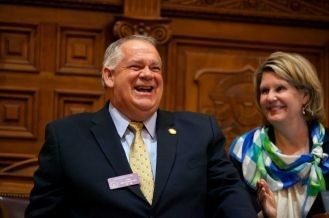House Bill 990, co-sponsored by House Speaker David Ralston and Speaker Pro Tem Jan Jones, both Republicans, would essentially negate Gov. Nathan Deal's ability to expand Medicaid, something the Republican governor has already refused to do under the federal health care law.
Bill supporters, which include Deal, say it gives appropriate legislative authority for a policy decision that would have a significant economic effect on the budget. They argue the bill isn't political, although Republicans have clearly sought to put Democrats on the defensive by having to explain why they would oppose giving themselves a vote on whether to expand Medicaid.
"If the minority party doesn't want to have any say-so in that process, then they have a red button they can hit when we vote on the bill," Ralston, R-Blue Ridge, said Friday. "They can vote to abdicate that responsibility, and we'll see how that turns out."
It's just the latest example of the political maneuvering to be expected during an election-year legislative session. Adding to the dynamic is state Sen. Jason Carter, a Democrat representing parts of metro Atlanta, who has announced he'll be running for governor this year. He has been the most visible critic of Deal, who is seeking re-election, and Republican legislative priorities.
When Deal proposed a $547 million increase in state education funding for the next budget, Carter argued the governor's cuts in prior years had forced local school boards to shorten the school calendar and local officials to raise property taxes. Deal countered he had shielded K-12 education funding in recent years from cuts and that this year was the first in which growing revenues allowed for a sizeable increase.
There's no question education has and will remain a major campaign issue both in the general election and in the upcoming Republican primary, when one of Deal's challengers is state schools Superintendent John Barge. Barge has been just as critical of Deal on education funding as he looks to woo Georgia's educators.
Deal has had to address other concerns over changes to the state employee health plan aimed initially at saving money but resulted in a political headache when teachers rallied against higher premiums and fewer options. In the end, Deal worked with state officials to spend about $114 million in the plan's reserves to reduce co-pays, and Democrats continue to criticize his handling of the issue.
But it's Medicaid expansion and who should have the power to make that decision that has opened up a new attack line likely to continue into the general election. The Georgia Republican Party has already launched an automated call criticizing Carter as "wanting the governor and not the General Assembly to decide" the issue.
Carter has said he will not vote for the House bill, calling it "purely political" and noting the first half of the bill features various statements about how Deal has been fiscally responsible and opposes Medicaid expansion.
"It's all about passing the buck, and the shell game and trying to avoid responsibility for making these decisions," said Carter, grandson of former President Jimmy Carter.
Carter has said he isn't committed to expansion as defined under the federal health care law and would be open to alternatives pursued by other states. Deal has said Georgia cannot afford the long-term costs of expanding those eligible for Medicaid. This week, Deal said if lawmakers were ultimately to approve expansion: "I always have a veto pen if I don't agree with it."
Meanwhile, Democrats are rallying in opposition. House Minority Leader Stacey Abrams, D-Atlanta, said she will not vote for the bill because it puts off the ultimate decision to expand Medicaid at least another year.
"The decision to change this in the last days of the session is very difficult to justify, if it means thousands of Georgians will be left without insurance and that is something we should all be concerned about," Abrams said.
Republicans could be seeking to neutralize the issue for the general election. While unpopular among GOP primary voters, the issue could be used by Democrats to gain traction among independent voters in the fall.
"It gives a bit of a shield for the governor," said Charles Bullock, political science professor at the University of Georgia. "It's not just him alone. It's the whole Republican Party getting behind this."

Ralston and Jones
http://accesswdun.com/article/2014/2/271546
